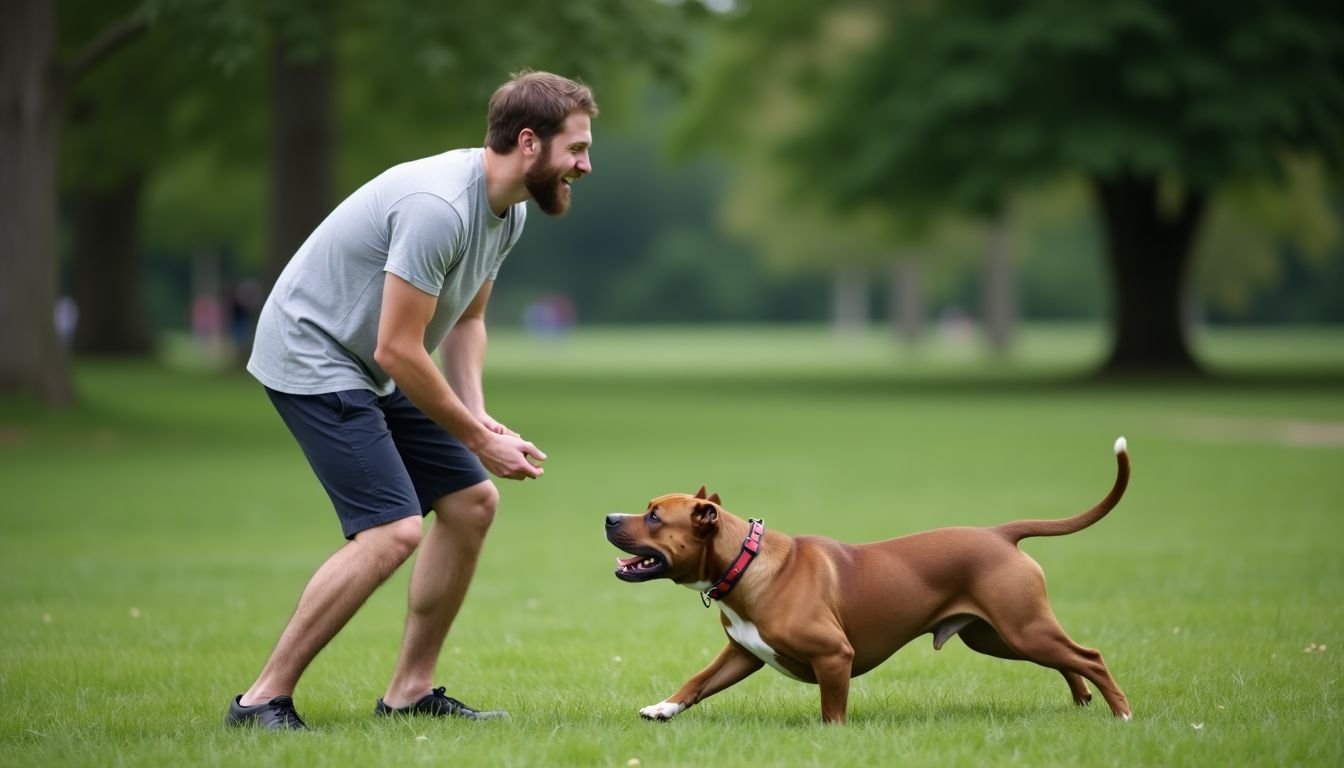Are Pitbulls A Dangerous Dog? Debunking Myths and Facts

Many folks wonder, “Are Pitbulls dangerous dogs?” It’s a question that sparks debate and concern. I’ve found myself curious about this too and decided it was time to dig into the facts.
Often, fear comes from not knowing everything. One fact really made me think: studies show that a dog’s breed doesn’t mean it’s more likely to bite. This pushed me to uncover more truths.
In my search, I discovered things about Pit Bulls that bust common myths and stereotypes wide open. My article aims to highlight what truly influences dog behavior and how being a responsible owner makes all the difference.
If you’re curious about separating pit bull facts from fiction, stick around for some surprising insights!
Key Takeaways
- Pit bulls were originally bred for tasks like farming and guarding, not just fighting.
- Studies find no link between a dog’s breed, like pit bulls, and their chance to bite. How they are raised matters more.
- Myths about pit bulls having “lock jaws” or being extra aggressive are false. Each dog acts based on its training and care.
- Bad laws against specific breeds don’t make people safer from dog bites. Training and understanding your pet is better.
- Education and proper training can help fight stereotypes about pit bulls. They can be loving pets with the right care.
Myth: Pit Bulls are inherently dangerous

Many people think that Pit Bulls are naturally dangerous dogs. This idea comes from their past and some bad stories.
History and purpose of pit bulls
Pit bulls have a rich history. They were bred in the early 1800s for various tasks. Farmers used them to help with livestock and guard their homes. These dogs are strong and loyal, making them great helpers.
Sadly, some people began to use pit bulls for bear fighting in British blood sports. This violent past has stained their reputation. Many still think of pit bulls as dangerous because of this history.
Today, however, they can be loving family pets if raised right. Understanding the true purpose of these dogs helps combat the myths surrounding pit bull behavior and aggression.
Selective breeding for aggression Selective breeding for aggression shaped many dog breeds, including pit bulls. In the past, breeders aimed to create dogs that could fight or hunt. This led to a strong focus on traits like power and tenacity.
Selective breeding for aggression shaped many dog breeds, including pit bulls. In the past, breeders aimed to create dogs that could fight or hunt. This led to a strong focus on traits like power and tenacity.
Some people think this makes them dangerous by nature, but that’s not true.
Today, most pit bulls live as family pets. They can be loving and gentle companions. The idea that all pit bulls show aggressive behavior is a big myth. Each dog has its own personality based more on training than just breed history.
From my experience with dogs of various breeds, I’ve seen how care from responsible owners impacts behavior greatly.
Misconceptions about pit bull behavior
Many people think pit bulls are always aggressive. This is simply not true. Misconceptions about pit bull behavior come from their past, which included bear fighting in British blood sports.
Today, they do not have to act this way. I have seen many friendly pit bulls that love other dogs.
Pit bulls do not have a special jaw structure that lets them “lock” onto anything. All dogs have similar jaws and abilities. Claims of higher pain tolerance for bully breeds are also false.
My experience shows that each dog has its own personality and can be kind or mean, just like any other breed. Understanding these things helps break down the myths around pit bull safety and temperament.
Fact: Pit Bulls are not inherently dangerous

Pit bulls are not born dangerous. Many studies show that a dog’s behavior depends on its environment and how it is raised.
Studies on dog aggression
Studies show that dog aggression is not linked to breed. Research indicates that all dogs have similar chances of biting. In fact, peer-reviewed studies found no connection between a dog’s breed and its likelihood to attack.
This means Pit Bulls are not more dangerous than any other dog.
Many factors shape a dog’s behavior. These include training, socialization, and the owner’s actions. I’ve seen many gentle Pit Bulls who love being around people and other pets. The idea that certain breeds are always aggressive is simply wrong.
It’s essential to focus on responsible ownership rather than breed myths when discussing pit bull aggression or temperament.
Environmental and situational factors
Many factors affect a dog’s behavior. The way I raise and train my pit bull plays a big role. A well-trained dog is less likely to show aggression. Breed-specific legislation can make owning a pit bull harder.
This creates fear and misunderstanding in the community.
Pit bulls do not automatically hate other dogs or animals. Each dog has its own personality shaped by its environment. My pit bull may get along well with others if properly socialized from an early age.
Understanding these environmental factors helps fight pit bull stereotypes and promotes positive interactions between all dogs, regardless of breed.
The role of responsible ownership
Responsible ownership plays a key role in the behavior of any dog, including pit bulls. These dogs are not inherently dangerous. Studies show that breed does not affect a dog’s chance to bite.
My experience as a dog owner tells me that training and socialization matter most. Proper education helps us understand our pets better.
I have seen how important it is to create good environments for our dogs. Pit bulls can be loving and gentle with proper care. They can also bond well with families, known by some as “nanny dogs.” Each dog has its own personality, so I always focus on their needs and behaviors rather than just their breed.
With responsible ownership, we set the stage for a happy life together.
Debunking Other Myths Surrounding Pit Bulls

Pit Bulls have a reputation that is often unfair. Many people think they are dangerous, but they can be great pets. Some say Pit Bulls are “nanny dogs,” known for being good with kids.
Others worry about their jaw strength, claiming they can lock their jaws like no other breed. These myths don’t match the facts about this loving breed. Want to know more? Keep reading!
Pit Bulls as “nanny dogs”
Pit Bulls are often called “nanny dogs.” This nickname comes from their history as family pets. Many have been known to be gentle and loving with children. They were once cherished for their loyalty and care around kids.
I’ve seen them interact with my own children, showing patience and affection.
A common myth is that Pit Bulls are dangerous. Studies show they are not inherently more likely to bite than other breeds. All dog breeds can act differently based on training and socialization.
My experience proves that individual behavior matters more than breed stereotypes.
Pit Bulls’ ability to “lock their jaws”
Many people think pit bulls can “lock” their jaws. This idea is a myth. All dog breeds, including pit bulls, have similar jaw structures and abilities. No breed has a unique feature that allows them to hold on tighter than others.
The belief that they have this special ability adds to the fear around pit bulls. It shapes opinions on their temperament and leads to unfair stereotypes. The truth is simple: dogs bite for many reasons, not because of how strong their jaws are.
Understanding this helps us see pit bulls more clearly as pets deserving love and care instead of fear.
Pit Bulls as the most dangerous breed
Pit bulls are often labeled as the most dangerous breed, but this is not true. Studies show that pit bulls are not more likely to bite than other dogs. All breeds can be aggressive based on their environment and how they are raised.
I’ve seen many well-behaved pit bulls that love their families and get along with other pets.
The myth about pit bulls being especially dangerous comes from a violent past in bear fighting. This history does not define every dog today. Like all animals, each dog has its own personality.
Good training and responsible ownership matter more than any breed label when it comes to temperament and behavior.
The Importance of Addressing Stereotypes and Promoting Responsible Ownership

Stereotypes about pit bulls can harm these dogs and their owners. It’s crucial to teach people the truth about pit bulls and how to care for them properly.
Impact of breed-specific legislation
Breed-specific legislation often targets pit bulls. This law claims to reduce dog bite incidents. Many people think it makes dogs safer, but that’s not true. Studies show these laws do not lower the chance of bites.
They unfairly judge all pit bulls based on the actions of a few.
I have seen how these laws affect good owners and their pets. Responsible ownership matters more than breed in preventing attacks. When I hear about bans, I think about my friends with pit bulls who are sweet and friendly.
Education on proper training and socialization is important for all breeds, including pit bulls.
The need for proper education and training
Proper education and training are key for all dog owners, especially those with pit bulls. These dogs have a unique history that can influence their behavior. They were bred for tough tasks in the past, but this doesn’t mean they are aggressive today.
Studies show that a dog’s likelihood to bite is not linked to its breed.
Training helps shape a pit bull’s temperament. It teaches them how to behave around people and other animals. My own experience shows that socializing these dogs early makes a big difference.
With love and responsibility, they thrive as friendly companions. Resources like local classes or online guides can offer valuable support for new owners seeking to understand proper pit bull ownership and training practices.
Resources for Pit Bull owners and advocates
I found many helpful resources for Pit Bull owners and advocates. Training programs can give you tools to better understand your dog’s behavior. Some groups focus on pit bull training and socialization.
They help change negative perceptions about this breed.
Support networks are also key. Many online forums share pit bull statistics and success stories, showing how loving these dogs can be. Education is vital to challenge misconceptions about their temperament.
I encourage others to connect with local shelters or breed-specific rescues that offer guidance and support for responsible ownership.
Conclusion
Pit bulls are not inherently dangerous dogs. Many studies show that a dog’s breed does not determine if it will bite. All breeds, including pit bulls, can display aggression based on their environment and how they are raised.
A responsible owner plays a big role in shaping a dog’s behavior.
It’s crucial to address myths about pit bulls. For instance, the idea that they can “lock” their jaws is false; all dogs have similar jaw structures. Pit bulls have been wrongly labeled as the most dangerous breed despite studies disproving this claim.
By educating ourselves and promoting responsible ownership, we create safer communities for everyone who loves dogs.
FAQs
1. Are pitbulls a dangerous dog breed?
Pitbulls, like any other canine, can be dangerous if not properly socialized or trained. However, it’s crucial to debunk myths and understand that the temperament of a pit bull is often determined by its upbringing.
2. What are some common misconceptions about pit bulls?
Common misconceptions about pit bulls include them being naturally aggressive. This belief stems from dog breed research that doesn’t take into account factors such as environment and training.
3. How does the temperament of a pit bull compare to other breeds?
Pit bull temperament varies greatly just like in any other breed. Proper socialization can lead to a friendly and loving pet that behaves well with humans and other animals.
4. Does animal aggression automatically mean a pit bull is dangerous?
Animal aggression doesn’t necessarily make a Pit Bull or any dog dangerous to people. Aggression towards dogs doesn’t equate to human aggression; understanding this helps in debunking myths around Pit Bulls.